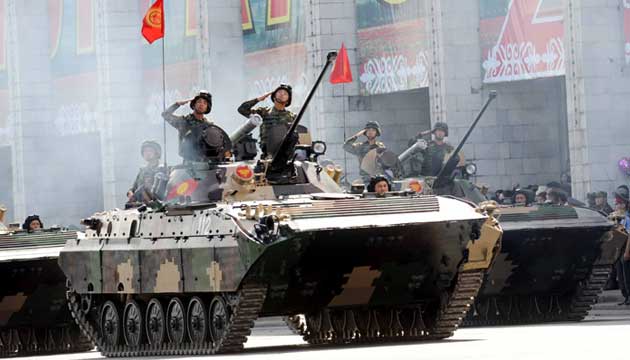
Kyrgyzstan’s National Security Concept Legally Enshrines Strategic Balance
Publication: Eurasia Daily Monitor Volume: 9 Issue: 149
By:

The US Congress’s consideration of future policy on Central Asia during the July 24 hearing of the Subcommittee on Europe and Eurasia of the House Foreign Affairs Committee received widespread coverage in Central Asian and Russian media. However, US policymakers showed no awareness of the most insightful and remarkable security document to emerge in post-Soviet Central Asia; this lapse like many others, may now be calibrated into the Obama Administration’s post-2014 engagement plans with Central Asia (see EDM, August 1, 2).
On June 12, 2012, Kyrgyzstan’s President Almazbek Atambayev signed into law the country’s new National Security Concept (NSC). The security document is crucial to understand the long-term trends in Bishkek’s strategic policy planning, and offers insights into how the country’s political-military elite views issues ranging from threats to the state’s security, the role of the Collective Security Treaty Organization (CSTO) or foreign military basing. Ahead of the NATO withdrawal from Afghanistan and US strategic realignment in the region post-2014, Kyrgyzstan’s NSC will form the bedrock of all other security documents, including a planned new Military Doctrine (KyrTAG, June 12). Before turning to consider the detail in the NSC, it is important to note that the publication of this key document marks a milestone in the development of a fledgling parliamentary democracy in the Kyrgyz Republic, which can be demonstrated by reference to two facts: in neighboring Uzbekistan no security documents are published, as they are closed documents, while Astana also classifies its National Security Concept as a state secret.
However, there is arguably much greater significance linked to the NSC than merely highlighting its publication as a step forward; the document contains important guidelines for Kyrgyzstani defense, security and foreign policymakers and will de facto serve also as a guide to international organizations and governments interested in promoting Kyrgyzstan’s security or in assisting in democracy building efforts. The preamble to the NSC defines the concept as “officially adopted views” on the long-term protection of society from security threats and notes its legal basis in the constitution, laws and national security treaties to which the country is a signatory. The document is then divided into five parts: considering global development trends and the position of the Kyrgyz Republic in the world; defining the country’s national interests; outlining the external and domestic security threats; classifying security of the “individual, society and state”; and concluding with an explanation of the system of national security monitoring and crisis response (https://www.vesti.kg/index.php?option=com_k2&view=item&id=13270&Itemid=117).
In the first section of the NSC, among other features, the role of international multilateral security organizations is noted, and reference is made to the Commonwealth of Independent States (CIS), CSTO, the Eurasian Economic Community (EurAsEC) the UN, EU, NATO, the Shanghai Cooperation Organization (SCO) and the Organization for Security and Cooperation in Europe (OSCE). While admitting the need for balancing its relations among these, the CSTO is singled out as the most important multilateral security organization in which the country holds membership, as well as its link to the SCO: “the Collective Security Treaty Organization (CSTO) is to some extent the mechanism for national and regional security efforts within the CIS space. The CSTO and the SCO have also been cooperating in the fight against terrorism and extremism in Central Asia, signing a protocol on cooperation on June 14, 2011 to enable more effective coordination to counter extremist activity.” Regarding the CSTO, the NSC recognizes the ongoing transformation of the organization, aimed at enhancing its “effectiveness and capabilities” to respond to or pre-empt potential threats as well as support the collective security of its members (https://www.vesti.kg/index.php?option=com_k2&view=item&id=13270&Itemid=117).
Prior to considering the threats to national security, the second part of the NSC contextualizes the country and its geopolitical position in the region; it identifies the negative impact in recent years of ethno-regionalism in the Kyrgyz Republic, the lack of a national idea to unite the society, and the weakness of civil identity among the country’s different ethnicities. In section three, turning to consider the nature of threats facing Kyrgyzstan, these are noted as real or potential and external as well as domestic. The NSC describes the threats to national security as follows:
External threats –
• growing conflicts amongst the leading world powers globally and in Central Asia, as well as between some countries of the region;
• expansion of international terrorism and religious extremism;
• international drug trafficking in Central Asia;
• worsening water and energy problems in Central Asia;
• outstanding international and legal formalization of state borders between some countries of the region;
• unresolved demographic problems in the Fergana Valley.
Domestic threats –
• increasing separatist tendencies, interethnic animosities, ethno-regionalism and provincialism in social relations;
• deterioration in public education, ethics and culture; greater influence of nontraditional religious sects in social life; challenging demographics in some areas of the country; unregulated external and domestic migration;
• ineffective system of government;
• critical economic climate and energy supply vulnerability;
• growth of the grey economy and corruption in all social spheres;
• crime, drug addiction, alcoholism and unemployment;
• underdeveloped information technology and a poorly protected information space;
• ecosystem degradation, exhaustion and unsustainable utilization of natural resources, and an ineffective early warning and response system for natural and technogenic emergencies (https://www.vesti.kg/index.php?option=com_k2&view=item&id=13270&Itemid=117).
Although there is little in the content of the threat perception that is surprising, given the development of Kyrgyzstan’s state security structures in recent years and the internal convulsions that have so badly inhibited the country’s development and even threatened its survival. Two facts should be noted in the threat perception: the large imbalance in favor of domestic threats and the recognition that the ineffectual nature of government in the country could also undermine the state’s security. The NSC then considers the increased sense of rivalry between global powers – as seen from Bishkek – the changes in the international security system, as well as the Arab Spring and tension over Iran. Russia, China and even the EU are portrayed as entering the “confrontation zone,” largely contending for raw energy resources in Central Asia (https://www.vesti.kg/index.php?option=com_k2&view=item&id=13270&Itemid=117).
The NSC then declares of great importance, not only the CSTO, but its recent agreement (December 2011) “not to allow foreign military bases and sites without the consent of all member countries, which affects in a major way US interests in the region.” This will bind the room for maneuver Bishkek has in its future options on foreign basing rights. This is balanced by referring to the continued long term security interests of the US and its Allies post-2014. China is expected to boost security ties bilaterally and through the SCO in order to ensure that Central Asia does not become safe haven for Uyghur separatists. The NSC concludes on this basis that “a key factor of the domestic stability of each Central Asian nation is therefore willingness to take into consideration the divergent interests of Russia, the US and China, each of which regards Central Asia as a zone of its strategic interests.” Again, given Bishkek’s balanced foreign and defense policies in recent years, walking a tightrope at times to assuage these powers, it seems unsurprising to see this element included in the NSC. However, the difference is that this policy of balance is now enshrined in law, and the security documents issued in the future, which will form a broader picture of Bishkek’s strategic policy approaches, will be clearer in the new Military Doctrine (https://www.vesti.kg/index.php?option=com_k2&view=item&id=13270&Itemid=117).
In terms of the military, the NSC promises to: “develop a new Military Doctrine that is in line with present-day conditions; maintain Kyrgyzstan’s defense capability at the level of defense sufficiency; enhance the all-around mobilization preparedness of territories, government agencies, organizations and the public to ensure military security and take part in civil protection and territorial defense; expand and strengthen confidence-building measures and participate in arms control; establish and develop equal partnership relations with international military-political organizations and countries; expand military cooperation with neighboring countries; implement a single national policy and create an armed defense suitable for mountain combat and commensurate with the country’s economic capabilities” (https://www.vesti.kg/index.php?option=com_k2&view=item&id=13270&Itemid=117).
These tasks are enormously challenging and will now be overseen by the country’s Defense Council. However, the new Kyrgyzstani NSC represents the first official level security document since the NATO withdrawal from Afghanistan was announced. There is surprisingly little in the NSC that relates to Afghanistan, while the threat perception rightly places more emphasis on domestic threats, and the problems of governance and combating internal endemic corruption. It cements the role of the CSTO in Kyrgyz security policy, recognizes Moscow’s veto on basing rights, and enters into law its, until now, long-term policy of trying to balance its relations between larger or great powers. Reconciling the high aspirations of the NSC will prove challenging for Bishkek and its partners.




